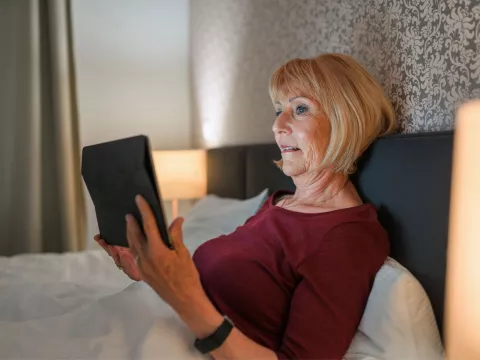- AdventHealth

During winter storms, staying warm, hydrated and nourished is key to avoid getting sick, and following emergency orders at the state or county level helps you avoid accidents outdoors and on the roads. But it’s also important to know how to get medical care if an illness arises or an accident happens during a winter storm.
What to Do in a Health Crisis During a Winter Storm
The harsh weather conditions of winter storms can make it unsafe to leave home for medical care, but there are still ways to get the help you need. Ultimately, the kind of medical care to get in a storm depends on the health crisis. In a medical emergency, always call 911 immediately. For something that’s non-life-threatening, you can see a doctor from home in a telehealth (also called telemedicine) visit.
When to Get Telehealth Care
For minor health concerns, a telehealth visit is a way to speak with a health care provider from home, and is something you can do via a smartphone, laptop or tablet if the power is out. Call your primary care doctor to see if they have a telehealth option or, if you don’t have a doctor, you can see our urgent care team 24 hours a day in a video visit through the AdventHealth app.
During your video visit, a health care provider can treat you for most minor health concerns, including:
- Allergies
- Acid reflux
- Back pain
- Bronchitis
- Cold and flu symptoms
- Ear infection or sinus infection
- Minor burns, cuts, bumps and scrapes
- Minor COVID-19 symptoms of cough or fever
- Nausea or vomiting
- Pink eye
- Rash/hives
- Skin conditions
- Urinary tract infections (UTIs)
AdventHealth telehealth doctors are available to see you 24 hours a day via video visit appointments in the AdventHealth app. Our providers will diagnose your urgent health problem and recommend a treatment plan that you can do safely from home during the storm.
When to Call 911 for Emergency Care
In a medical emergency — an illness or injury that’s life-threatening — call 911 right away from your mobile or landline phone. For your safety, do not attempt to drive to a hospital in a storm. When you call 911, an emergency medical services team will come to you as quickly as possible. Ambulances are better equipped to drive in the ice and snow and safely take you to the hospital.
Call 911 to get care quickly for emergencies like:
- Animal bites
- Asthma attacks
- Chest pain
- Concussion
- Coughing up blood
- Deep wounds
- Difficulty breathing
- Eye injuries
- Fractures where a broken bone is visible
- Head injuries
- Major trauma (sudden physical injury)
- Poison exposure or swallowing
- Seizure
- Severe abdominal pain
- Severe allergic reactions
- Severe burns
- Shock
- Suspected heart attack or stroke
Call 911 immediately for emergency COVID-19 symptoms as well, including:
- Bluish lips or face
- New confusion or inability to rouse
- Persistent pain or pressure in the chest
- Trouble breathing
Keeping You Safe and Protected in Every ER
If you or a family member experience a medical emergency during a winter storm, rest assured that every AdventHealth emergency department is well-equipped to meet your needs quickly and keep you protected, too. All of our facilities have enhanced safety measures in place to keep you safe from COVID-19 while you’re in our care.
We’re Here to See You Through the Storm
We know that winter storms can damage more than just roads and homes, and we don’t want you to feel isolated or alone. Our telehealth doctors are experts in their fields and can address any minor health concerns quickly, but they’re also caring and understanding of what you’re going through right now.
We want to help you weather winter storms safely, with your health as one less worry on your mind. To speak to our team, learn more about video visits in the AdventHealth app and see a health care provider through a telehealth video visit today.



